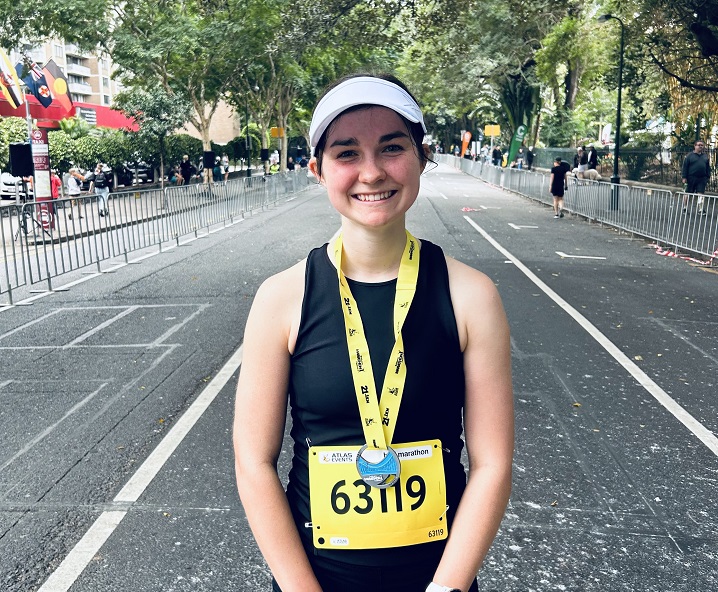CCA launches new research into Quality of Care for kids with IBD
30 May 2024 – Crohn’s and Colitis Australia (CCA) has launched the results of the Inflammatory Bowel Disease (IBD) Paediatric Quality of Care Hospital Audit 2023, undertaken with support from the Federal Government.
The report was launched at a Parliamentary Friends of Auto Immune Diseases event Chaired by Jenny Ware MP, Federal Member for Hughes and fellow Co-Chairs Dr Gordon Reid, Member for Robertson and Dr Sophie Scamps, Member for Mackellar, alongside sector leaders, people living with IBD and Directors and staff of CCA.
Some of the key findings include:
The process of diagnosis is harder than it should be
The lead-up to diagnosis for a young person is often described as “long”, “frustrating”, and an emotionally draining “fight” with healthcare providers for action.
Increased mental health risk
Young people with IBD have more than a 50% risk of developing mood or anxiety disorder. Despite this, none of hospitals audited had an on-site psychologist as part of their IBD treatment team.
Lack of access to medication
IBD medications listed on the Pharmaceutical Benefits Scheme are limited for youth, compared with adults.
Lack of access to healthcare professionals
Most youth living with IBD don’t have access to a multidisciplinary team: only 23% of Crohn’s Disease inpatients were seen by a IBD nurse, compared with 33% in 2014.
While funding announced in the federal budget for GutSmart – a CCA initiative that delivers online training courses for GPs and health professionals on the topic of IBD – will go some way toward addressing some of these issues, CCA is calling for more funding and IBD research investment towards #savingkidsguts and avoiding unnecessary surgeries through earlier diagnosis and access to broader treatment options.
Associate Professor Ed Giles, Head of IBD Paediatric Quality of Care Project Advisory Committee who led the audit, spoke about the impacts he sees on the young people he treats.
“In my practice, three of my paediatric patients were given access to off label medication, which ultimately, was the only reason they kept their colon. Giving young people access to the same medications that adults have, would prevent so many kids from going on to live a life full of medical complications,” says Associate Professor Giles.
He also says that the mental health of young people with IBD is a great concern that the healthcare system needs to address.
“There needs to be more emphasis placed on the role that IBD nurses play and the level of psychological support needed. Over half the young people in this survey exhibited clinical levels of distress. IBD is a lifelong condition which means we need to provide long term mental health support, especially for young patients who are already at a psychologically vulnerable time of their life.
“One young patient I treated was in year 12. By the end of the school year, we had treated him, and he was physically well but all of his friends went on to university whereas he didn’t leave the house for two years,” says Associate Professor Giles.
MP Jenny Ware lives with Crohn’s disease and said that she has always been reluctant to talk about her experiences but with young people in room brave enough to speak, then she needed to speak about her experiences.
“I was diagnosed with Crohn’s disease in 2001. Since that time, I’ve had multiple surgeries, multiple admissions to hospitals and taken various treatments. In 2010, after a major surgery I had a colostomy bag for several years. At the time, I was very sick, I had young children and was working as a lawyer. However, I was an adult. I can’t imagine how it would have been if I was a child or teenager going through that trauma or if I was a parent whose child was going through this,” she told the gathering.
Anyone diagnosed with Crohn’s or colitis can join CCA, a community that understands and provides support programs for children and young people. To learn more, visit https://www.crohnsandcolitis.org.au/ or call 1800 138 029.

Associate Professor Ed Giles and Awareness Month Champion Aiyahna spoke with ABC Host and CCA Ambassador Jacinta Parsons on ABC Radio National’s Life Matters program this morning about the care and support received by kids living with IBD and other chronic health diseases across Australia, especially in regional, rural and remote locations.
When asked what she would like to see change in regional locations for young people living with IBD, Aiyahna said: “Really getting that holistic help from a team of specialists. For me, I just had contact with a paediatric gastroenterologist, but it would have been great to have a team that I could contact for all of the different symptoms and consequences that pop up as a result of this diagnosis. For example, access to support nurses, and mental health support.”
You can listen to the interview here:
CCA CEO Joins EFCCA Roundtable discussion in Mexico City

This year, the central theme for World IBD Day was “IBD Has No Borders,” emphasising the global nature of IBD and the need for collective action. EFCCA – the European Federation of Crohn’s and Ulcerative Colitis Associations – organised a roundtable discussion on May 17 in Mexico City, titled “Uniting for access to IBD care.”
The roundtable was launched by EFCCA Chairperson Salvo Leone and Beatriz Capdevielle from Vivir con Crohn y CUCI A. C., with keynote presentations by Prof. Dr. Britta Siegmund (ECCO President) and Prof. Claudio Fiocchi (Cleveland Clinic, US). It also featured a comprehensive panel discussion with leaders and stakeholders from Australia, Brazil, Canada and the US, with the aim of addressing barriers to quality IBD care, and advocating for increased awareness, support and resources. The shared goal was to formulate a set of shared recommendations aimed at improving the situation for IBD patients globally.
Representing Crohn’s and Colitis Australia at EFCCA’s roundtable, CEO Leanne Raven said: “on #WorldIBDDay 2024, we have begun a new path of connected voices to advocate for a cure for IBD as IBD has no borders.”
“We all have common understandings of the impact of these complex chronic conditions and, even though we speak with different languages, we have similar unmet needs and priorities and a wonderful opportunity to learn from each other,” she added.
The event marked a significant step towards uniting efforts globally to improve access to IBD care.
Shine a Light on World IBD Day – 19 May
Australia, 16 May 2024 – This World IBD Day, towns and cities around Australia are joining the global movement to highlight the experiences of those living with Inflammatory Bowel Disease (IBD). World IBD Day brings people together in their fight against ulcerative colitis and Crohn’s disease – collectively referred to as IBD.
Nearly 90 landmarks around the country will light up purple on Sunday evening as part of the ‘Shine A Light- World IBD Day’ movement. The list includes iconic sites like the GABBA in Brisbane, Camperdown Memorial Park in Sydney, the MCG (Melbourne Cricket Ground) and Trafalgar bridge in Perth. Each state and territory has multiple landmarks that will turn purple for the evening as part of the campaign. You can see the full list here.
In Australia, it’s estimated that 8,000-10,000 young people under the age of 18 are living with these incurable diseases. That’s why Crohn’s and Colitis Australia (CCA) are putting the spotlight on kids and teenagers who are living with ulcerative colitis and Crohn’s disease.
An Australian government funded research project led by CCA found that care is not tailored to the needs of young people living with IBD, with more than a third of young people (38.3%) not being referred to a paediatric gastroenterologist upon first suspicion of IBD. The survey also found that the system is not equipped to deal with the psychological burden IBD can impose on young people. The risk of mood or anxiety disorder among youth in this research was substantial (50.8%) yet 62.4% of young people surveyed reported no query about their mental health from a health professional in the last year.
Leanne Raven, CEO of Crohn’s and Colitis Australia (CCA) said this World IBD Day will be crucial in making people aware of the gaps in the healthcare system.
“What we’re seeing is that young people are really struggling to even get a diagnosis in the first place. And when they finally are diagnosed, the system is geared towards the treatment of adults which makes it much harder for young people to manage their disease and get educated.
“IBD is disruptive to the lives of young people when they are in critical stages of their development and education. Not only are the physical health effects impacting their quality of life, but the mental health impacts mean that kids and teenagers are fighting a huge uphill battle.
“Our healthcare system doesn’t cater to the needs of young people and we’re calling for policy changes to address gaps in accessibility to multidisciplinary healthcare teams, psychological support, the availability of educational resources and access to prompt advice, specialist review, and procedures.
“We’re grateful for the support of all the ‘Shine a Light’ sites that will light up on 19 May. This is crucial support that brings visibility to these diseases and, quite literally, helps to shed light on the experience of those living with IBD. It’s shows of support like this that bring us one step closer to finding a cure,” said Ms Raven.
Anyone diagnosed with Crohn’s or colitis can join CCA, a community that understands. To learn more, visit https://www.crohnsandcolitis.org.au/ or call 1800 138 029.
Artificial intelligence or AI are computer algorithms that have the ability to learn, solve problems and make decisions. In recent years AI has become more advanced and several types of AI such as Chat GPT2 (an advanced chat bot) have made the news and become well known and easy to access. Currently, AI is in use in medicine and has been approved for the detection of polyps in colonoscopy where it assists doctors by highlighting suspicious lesions on the screen. This process involves the AI analysing large amounts of data so that it can ‘learn’ complex pattern recognition, similar to how doctors learn how to make medical decisions.
Three scientific review articles published in the last two years by gastroenterologists from around the world have shown that AI can assist with the diagnosis, treatment, and prediction of Inflammatory Bowel Disease (IBD). Currently, the cause of IBD is not well understood but it is believed that genes and gut microbiome are contributing factors. AI can analyse large amounts of genomic data to discover new genes that may increase the risk of IBD. AI can also analyse the many types of bacteria present in the gut to see if there are any types associated with IBD.
The diagnosis and assessment of IBD requires tissue to be taken and analysed using a microscope but there are challenges surrounding the interobserver variability where two different pathologists may score the same sample differently. AI has shown promise in this area as it can detect certain types of cells in tissue with a similar ability to a pathologist.
AI can be trained to analyse videos in endoscopy in order to grade the severity of IBD and can prevent errors made due to human fatigue. An example is Video Capsule Endoscopy where the patient swallows a small camera that has the ability to record videos of the entire small bowel. Normally it takes 96.6 minutes for a doctor to review the entire video but with the assistance of AI this time is reduced to 5.9 minutes without any loss in performance.
AI can also make IBD research faster and more efficient. One aspect is that it can analyse patient data bases much faster than a human and find which patients are suitable to be recruited for certain IBD studies.2 AI can also discover new drugs in the treatment of IBD. Based on a database that record the types of proteins found in patients with IBD, AI can detect which ones can be a target for future immune therapies.
AI also has limitations and thus cannot completely replace a doctor in the treatment and diagnosis of IBD. AI currently struggles to find the difference between ulcerative colitis and Crohn’s disease based on endoscopy and will need to undergo training through analysis of IBD video databases. AI also needs to be trained to ignore minor scratches to the bowel caused by the scope in endoscopy and sites where biopsies are taken as they are currently detected as IBD due to the similar appearance. AI is only as good as the data it is trained on. AI can struggle to differentiate between IBD and other rarer diseases with similar appearances because there are limited data on the rarer diseases available. Finally, AI is unlikely to replace the rapport and interpersonal relationship between a doctor and a patient.
Survey: Sexual and reproductive health needs of women who live in Australia with Inflammatory Bowel Disease.
Researchers at Western Sydney University and Auckland University of Technology want to understand what the sexual and reproductive health needs are of women who live in Australia with the chronic condition of Inflammatory Bowel Disease.
If you have a diagnosis of Inflammatory Bowel Disease, and would like to have your voice heard, please contact the research team at Western Sydney University using the email address: [email protected]
Any information you provide will be treated confidentially and will be used to inform strategies that enhance awareness about the sexual and reproductive health issues associated with inflammatory bowel disease. Click on the link below to complete the survey:
https://surveyswesternsydney.au1.qualtrics.com/jfe/form/SV_42el2fPpORED3Mi
Western Sydney University Human Research Ethics Committee Approval: H15913
Notice Of Annual General Meeting
Notice is given that an Annual General Meeting of the ACCA trading as Crohn’s & Colitis Australia (CCA) will be held online via video conference on Monday 27 May 2024 at 7pm AEST.
If you are a financial member of CCA attending the meeting or wish to provide an apology, please register online using the form below.
Please click the button below to download the notice of meeting, together with agenda and appendices.
Please enter your details below. Registered members who fill out this form will be contacted via email closer to the date of the AGM with the full meeting agenda and details of how to access the meeting via video conferencing.
Please note non-members will not be permitted to attend the meeting.
Registrations close 20 May 2024
For any enquiries regarding the AGM: 03 9815 1266 (option 0)
Sarah was told by a doctor, “I’ll eat my shoe if your three-year-old son has IBD”
Recently, we sat down to talk with Sarah *, the mum of now four-year-old Chris *, who was diagnosed with IBD last year – when he was just three years old. Being diagnosed with IBD at such a young age is very rare. So rare, in fact, that before he was diagnosed, Sarah and her husband Charlie were told by one doctor that he would “eat his shoe” if Chris had IBD.
Not only is Sarah the mum of a toddler with IBD, but she’s also a nurse practicing within the paediatric healthcare system, so she has unique insight into what it means for young people to be diagnosed with and to live with IBD.
The diagnosis
Chris had what his parents knew were abnormal bowel movements for his whole life. Even the staff at Chris’ childcare facility flagged with Sarah that it was unusual how often he went to the toilet during the day.
Despite this, Chris didn’t show many other signs of having a chronic illness. Sarah says, “To this day, he’s never really looked like a sick kid. He’s always been a happy kid and had lots of energy, so in some ways it was difficult to imagine that there could be anything wrong with him. But, still, I just knew something wasn’t right.”
After initially living in Melbourne, the family moved to Swan Hill in rural Victoria. They had previously been told by doctors that Chris was just experiencing normal “toddler diarrhea”. It was shortly after the move when they noticed blood in Chris’ stool and Sarah and her husband both knew that something was wrong.
Even at this stage, doctors were sceptical that Chris could have IBD but his parents insisted on doing further tests and even paid to have a Calprotectin test done. When the results came back, Sarah recognised indicators of a potential chronic illness. From there, further tests were performed and Chris eventually received his diagnosis.
Sarah says, “In one way, we’re lucky because he’s really taken it in his stride. So many kids struggle with understanding why they have to take medicine every day or stick to certain routines, which of course is a very natural response for kids to have. It’s just never really seemed to bother Chris much. In another way though, that is a bit sad because I think it’s just all he’s ever really known. He doesn’t know any different, so he doesn’t complain.”

The treatment
When we spoke with Sarah, she informed us that they had just made the decision to escalate Chris’ treatment because he wasn’t having the response to the treatment that they had hoped.
“When we first received the diagnosis, there was an element of relief after knowing deep down for so long that something wasn’t right but not knowing what it was. Now, it feels like we’re facing a lot more uncertainty.”
Chris was started on the least invasive medication. However, he didn’t respond to it the way that doctors hoped. After continuing to have acute flare ups, he has had a couple rounds of steroids which is a good short-term solution but should be avoided where possible as a long-term treatment. It was suggested to Sarah and Charlie that Chris progress onto immunosuppressants- a step they decided to take in the last few days.
“Even being a paediatric nurse, the decision was so hard to make. It’s totally different when it’s your own kid. You have so much to weigh up and it feels like there’s a lot of uncertainty,” said Sarah.
Life with IBD
Chris’ parents are grateful that, so far, his IBD hasn’t been much of an interruption to his school or to him participating in all the normal activities that a four-year-old should get to enjoy. His diagnosis and treatment have meant that they often need to travel back and forth to Melbourne, something that they just accept now as part of their lives. They’re unsure of how IBD will continue to impact on Chris or how it will progress, but for now they’re taking it one step at a time.
Sarah says that if she could give parents in a similar position one piece of advice it would be, “Always trust your instincts. We have a great healthcare system and the doctors have done a great job but also, you know your kid better than anyone else in the world.
“Keep advocating for your kids and keep pushing for answers because there are crucial factors in these things that may not be easily visible to a doctor in an examination room or in a set of test results. I understand that not everyone will have the knowledge that I do when it comes to recognising signs in test results and things like that but as a parent, you have an intuition about your kids and their health that no one else does.”
To learn more about Crohn’s disease or to support the work of Crohn’s and Colitis Australia, which provides a wide range of programs and advice to those living with IBD, visit. https://crohnsandcolitis.org.au.
*names have been changed
A Crohn’s diagnosis at age 15: Aiyahna’s Story

Aiyahna’s journey with Crohn’s Disease began when she was just 15 years old. Unlike many Crohn’s sufferers (where finding an answer can sometimes take years), her diagnosis happened quickly following the discovery of a fistula that had tunnelled its way through the wall of her colon, as well as ulceration and inflammation throughout the entirety of her digestive tract.
Diagnosis
Aiyahna was fortunate to be diagnosed when she was, as a Gastroenterologist happened to be flying into her hometown of Longreach, Queensland. He performed a colonoscopy and upon seeing the results, he had her flown to Brisbane the following day to have further tests.
Prior to being diagnosed, Aiyahna experienced intermittent symptoms like mouth ulcers, exhaustion, occasional nausea, emotional overwhelm and digestive disturbances. Both Aiyahna and her parents chalked these up to being due to the stress of her transition into senior high school. Aiyahna says, “In hindsight, we weren’t wrong – as stress is most definitely an environmental trigger for Crohn’s episodes and symptoms – we just weren’t aware that an auto-immune disease was the underlying cause of those symptoms.”
Treatment
Following her diagnosis, Aiyahna had an extended stay in hospital, which was followed by two months of exclusive nasal gastric (NG) feeding. As a 15-year-old, already going through the trials and tribulations of adolescence, Aiyahna says having to feed herself through a tube was “pretty embarrassing and awkward at times” but that she was thankful for the support of her family, her school and her peers.
“I went to a small school in Longreach. Having already been through the isolation of COVID and a stay in hospital, I decided I wanted to go back to school despite having to feed myself through a tube. My school was very supportive. They gave me a key to the library, which had a kitchen where I could go and feed myself in privacy.”
Despite choosing to attend school during this period, Aiyahna could often only attend for half days as the fatigue of Crohn’s would overwhelm her. Not only that, but attending treatment sessions meant missing days of school at a time.
Aiyahna was treated through regular infliximab infusions (supported by daily medications) to help her body progress into remission. She continues with her infliximab infusion treatment regime four years on and is grateful to have maintained remission during this time. At the end of 2023, she was able to stop taking her daily medications.

Life with Crohn’s disease
When we asked Aiyahna what advice she would give to any young people living with IBD she said, “A lot of the time, we’re told that having IBD will be a barrier or that it will make things too hard. I don’t believe that. Yes, of course, things will be hard, but we can still achieve our dreams. It’s not about putting pressure on yourself, it’s just about being willing to give things a crack. And I actually believe that having Crohn’s Disease has taught me more than it’s taken away from me. I’ve become a stronger, more confident person because of it.”
This sense of optimism and determination is clear in Aiyahna. Even during our chat, she’s in her uni library studying. Despite the extensive interruptions to her education and the challenges she’s faced over the last few years, she has moved to Brisbane where she’s studying at the University of Queensland to become a psychologist.
Aiyahna is grateful for the support she has had from her family throughout her diagnosis. When her mum spoke about the challenges of her daughter being diagnosed with Crohn’s Disease, she said, “I realised that it was not my job to clear the obstacles for her, to smooth her path, nor to give her the answers but rather, my job was to guide her to look for the possibilities within the struggle, to remind her to focus on her strengths and to use them to negotiate the obstacles she encounters.”
In June 2023, Aiyahna transitioned from the paediatric healthcare system into the adult healthcare system. She’s currently in conversation with her doctor about switching to self-injections for her infliximab and says the transition has given her more decision-making control over her treatment plan and ultimately more flexibility and independence in her life.
Aiyahna says, “Living with Crohn’s can feel like riding a rollercoaster at times. Starting with a huge uphill climb as our bodies recover, followed by enormous drops as we realise that our lives have to change, moments when we feel like we are flying upwards as we regain momentum in life and then those moments of coasting as we adjust to our new normal. However, I have found that around every corner there is a lesson learned and a strength found, empowering us from within and shaping the people we are yet to become.”
To learn more about Crohn’s disease or to support the work of Crohn’s and Colitis Australia, which provides a wide range of programs and advice to those living with IBD, visit https://crohnsandcolitis.org.au.
Research reveals that young people with IBD aren’t receiving the care they need.
Australia, 1 May 2024 – Research has highlighted gaps in the paediatric healthcare system for young people living with Inflammatory Bowel Diseases (IBD). This is why the focus of this year’s Crohn’s and Colitis Awareness Month- which is May – is the impact of IBD on young people.
The results from the Inflammatory Bowel Disease Paediatric Quality of Care Patient Experience Survey 2023 highlighted concerning issues in a number of areas but most concerningly, mental health, delay in diagnosis and treatment access:
- Mental Health: IBD can impose a profound psychological burden on young people
Young people with IBD have more than a 50% risk of developing mood or anxiety disorder. Despite this, the survey results identify access to mental health support as being problematic.
Over half the young people surveyed, reported no query about their mental health from any health professional in the past year (62.4%); and less than a third that accessed mental health support felt it was easy to do so (29.7%). Additionally, accessible mental health support was the most common suggestion for improved IBD care.
- Delay in diagnosis and access to prompt advice, specialist review, and procedures
Waiting times for specialist review of a suspected disease relapse surpassed the national standard of five days for around half of respondents (49.8%), often exceeding two weeks (26.8%).
People often sought private services such as radiology and colonoscopy/surgery services to avoid treatment delay (85.1% and 79.3%). Uncertainty or an outright lack of access to prompt advice via an email or phone helpline was common (23.7%).
- Care is not being tailored to the needs of young people
More than a third of young people (38.3%) aren’t being referred to a paediatric gastroenterologist upon first suspicion of IBD. The results also showed that information and educational opportunities are more often afforded to ang geared towards adults rather than youth.
Associate Professor Ed Giles, Chair, IBD Paediatric Quality of Care Project Advisory Committee, says there are issues that need to be addressed within the healthcare system when it comes to the quality of care that young people with IBD are receiving.
“While it’s encouraging to see improvements in some areas of care for young people who are either in the process of being diagnosed with IBD or who have already been diagnosed, it’s also concerning to see a regression in other areas.”
“We’re seeing gaps in healthcare infrastructure when it comes to dealing with the psychological impact that IBD can have on young people as well as increased barriers when it comes to accessing services, getting educated and being able to receive a diagnosis. The report also shows that young people in rural and regional areas are more likely to be impacted by these gaps in the system.
“If we take action on the information provided in these reports, we can make a real impact on the lives of young people living with IBD,” Associate Professor Giles said.
CCA recently interviewed Aiyahna, a young person with IBD and Sarah, the mum of a four year old boy who was diagnosed with IBD at the age of three. Their stories reflect the reality of what the latest research tells us.
Aiyahna spoke about the mental resilience required when living with IBD.
“Living with Crohn’s can feel like riding a rollercoaster at times. Starting with a huge uphill climb as our bodies recover, followed by enormous drops as we realise that our lives have to change, moments when we feel like we are flying upwards as we regain momentum in life and then those moments of coasting as we adjust to our new normal. However, I have found that around every corner there is a lesson learned and a strength found,” Aiyahna said.
Sarah is a paediatric nurse who lives with her family in rural Victoria and was told by one doctor that he would “eat his shoe” if her son had IBD. She spoke about the difficulties and the delay in receiving a diagnosis for her son and the scepticism she faced from doctors.
“Keep advocating for your kids and keep pushing for answers because there are crucial factors in these things that may not be easily visible to a doctor in an examination room or in a set of test results. As a parent, you have an intuition about your kids and their health,” Sarah said.
To read more about Aiyahna’s and Sarah and Chris’s stories, you can visit: News – Crohn’s & Colitis Australia (CCA) (crohnsandcolitis.org.au)
CCA acknowledges and thanks our generous sponsors, Pfizer, Johnson & Johnson, Dr Falk Pharma, Celltrion, Takeda and AbbVie.
For media enquiries contact Tiarna Adams 0478 074 288 or [email protected].
ABOUT CROHN’S & COLITIS AUSTRALIA
Crohn’s & Colitis Australia (CCA) has been working with people living with Crohn’s disease and ulcerative colitis, healthcare professionals, governments and the public to minimise the impact that these conditions have on the community since 1985. In that time, CCA has been the only Australian organisation working with and for patients and their families, the doctors that treat them, and the policymakers who can bring about change. CCA provides high quality information, supports life-changing research and campaigns vigorously – for more knowledge, better services and more support for people affected by inflammatory bowel disease. For more information, visit: https://www.crohnsandcolitis.org.au/
When I was 17 and still living in the UK, I had an upset stomach and started experiencing what I now know are symptoms of IBD – including blood in my stool, weight loss and an urgent need to go to the toilet with extreme regularity. I was told I had a stomach bug and that it would pass. Fast forward a couple of months where I wasn’t getting better, and – at the urging of my dad – I managed to get an appointment for a flexible sigmoidoscopy.
I vividly remember – I was lying in my hospital bed. I just came out of the scope, and a lovely nurse spoke to me and gave me like a printout about ulcerative colitis (UC). Then I saw a consultant a couple of weeks later and received the official diagnosis. At that time, I was very confused. I didn’t know what this illness was, or what it meant. I started doing my own research and kind of went from there, but I truly felt like I was the only person who had this condition. I felt very lonely and isolated — it was a lot to take in as a young person. My IBD nurses and close friends were fantastic in helping me get through this, but I think it’s relatively easy when you’re first diagnosed to exclusively focus on your physical wellbeing. As a consequence, I think it can be easy to neglect your mental wellbeing. I would strongly encourage others who are diagnosed to speak to somebody about what they are feeling and going through.


Following the diagnosis, I found social media to be a powerful tool in connecting with other people living with IBD. This was important for me in feeling less alone. I remember following this person on Instagram with ulcerative colitis, and experiencing a feeling of, “wow. Somebody has my illness.” Then, I explored the hashtags, and identified that quite a few people shared my condition. I created my own account – @ibdlottie – to share what I was going through. I have now developed a strong community and support network, and have made really good friends. Some of these relationships exist online, and I’ve met up with people in person due to this connection. Especially following my move from the UK to Australia, this community has been really important.
I’m not currently flaring, but I still have what I call ‘mini flare ups’. I’ll go through two or three days where I feel unwell, before recovering. I find that I do get quite tired and worn out, and I experience cramping and sore joints quite a bit. It can also take me longer to recover from illnesses, and there are certain foods that I can’t eat. I’m 24 now and I was diagnosed when I was 17. As such, it’s difficult for me to remember what my “normal” was. I sometimes get in my head, and am unsure as to whether I’m feeling a certain way because of my UC or not.
From a mental health perspective, talking to others about your experience has been so helpful in reducing feelings of isolation. After moving to Australia at the end of last year, I’ve had people message and say, “I didn’t know if I could travel with IBD, but seeing you do it has made me realise that I can do it.” My UC has also encouraged me to live in the moment, and to live to the fullest, particularly while I’m feeling well. For instance, I’m not sure I would’ve run a half marathon, or moved to Australia, if not for this attitude.
There’ll be good days and bad days, but I know that there’ll be opportunities to do things that challenge and excite me, and I’ll take on that opportunity whenever I can.
To share your story, click here.
Survey on the sexual and reproductive health needs of women in Australia with IBD
Researchers at Western Sydney University and Auckland University of Technology want to
understand what the sexual and reproductive health needs are of women who live in Australia with
the chronic condition of Inflammatory Bowel Disease.
If you have a diagnosis of Inflammatory Bowel Disease, and would like to have your voice heard,
please contact the research team at Western Sydney University using the email address:
[email protected]
Any information you provide will be treated confidentially and will be used to inform strategies that
enhance awareness about the sexual and reproductive health issues associated with inflammatory
bowel disease.
Click below to complete the survey:
https://surveyswesternsydney.au1.qualtrics.com/jfe/form/SV_42el2fPpORED3Mi